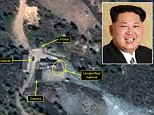BREAKING NEWS: Vladimir Putin publicly accused by U.S. government of plot to interfere in presidential election with hacking attacks
- Dramatic public statement says series of recent leaks which have revealed embarrassing Democratic Party emails were ordered by Kremlin
- Department of Homeland Security and Office of Director of National Intelligence made public denunciation
- Statement said 'senior-most officials' must have know about Russian 'thefts and disclosures intended to interfere with US election process'
- Warns that polling systems in some states appear to have been targeted but says it is not yet possible to say if there is a bid to rig election
- State and local election officials told they should get cybersecurity help from Homeland Security
The U.S. government on Friday formally accused Russia of a campaign of recent cyber attacks against Democratic Party organizations.
In an extraordinary joint public statement, the Department of Homeland Security and the Office of the Director of National Intelligence said it was confident that Russia's 'senior-most officials' ordered the attacks.
The statement amounts to an accusation that Vladimir Putin ordered interference in the American political system.
It is impossible for such an explosive charge to have been made without authorization from President Obama.
The statement said: 'The U.S. Intelligence Community (USIC) is confident that the Russian Government directed the recent compromises of e-mails from US persons and institutions, including from US political organizations.

Explosive charge: The claim that embarrassing leaks were the result of an operation ordered by 'senior-most Russian officials' would have to have been authorized by President Obama, who voted early electronically in the presidential election hours before it was issued

Implicated: The phrase Russia's 'senior-most officials' is clearly intended to identify Vladimir Putin, its strongman president, as having ordered the attacks
'We believe, based on the scope and sensitivity of these efforts, that only Russia's senior-most officials could have authorized these activities.'
It added: 'It would be extremely difficult for someone, including a nation-state actor, to alter actual ballot counts or election results by cyber attack or intrusion.
'This assessment is based on the decentralized nature of our election system in this country and the number of protections state and local election officials have in place. States ensure that voting machines are not connected to the Internet, and there are numerous checks and balances as well as extensive oversight at multiple levels built into our election process.'
The condemnation came amid escalating tensions between Washington and Moscow over a range of international disagreements, including U.S. charges that Russian air strikes in support of embattled Syrian President Bashar al-Assad have been hitting hospitals and other civilian targets in rebel-held eastern Aleppo.
California Democratic Sen. Dianne Feinstein, the vice-chair of the Senate Intelligence Committee, said in a statement that '[t]he administration's acknowledgement that Russian intelligence agencies are attempting to influence the U.S. election and undermine public confidence conveys the seriousness of the threat.
'Attempted hacking of our election system is intolerable, and it’s critical to convince the Russian government to cease these activities. If it does not, we must develop a strong response.'
Rep. Adam Schiff, a California Democrat who is Feinstein's counterpart in the House of Representatives, said in a statement on Friday that 'I applaud the administration's decision to publicly name Russia as the source of hacks into U.S. political institutions.'
'We should now work with our European allies who have been the victim of similar and even more malicious cyber interference by Russia to develop a concerted response that protects our institutions and deters further meddling.'

A 400-pound man named Ivan? Donald Trump downplayed the possibility of Russia's involvement in the hacks during the first presidential debate, saying it might have been China – or 'somebody sitting on their bed that weighs 400 pounds'
Republican presidential nominee Donald Trump will be left to explain himself on Sunday during the second presidential debate.
In his first head-to-head with Democrat Hillary Clinton, he claimed Russia's purported involvement in the series of high-profile computer hacks was by no means a given.
'I don't think anybody knows it was Russia that broke into the DNC,' he said.
'She's saying Russia, Russia, Russia, but I don't – maybe it was. I mean, it could be Russia, but it could also be China. It could also be lots of other people. It also could be somebody sitting on their bed that weighs 400 pounds, okay?'
'Now, whether that was Russia, whether that was China, whether it was another country, we don't know, because the truth is, under President Obama we've lost control of things that we used to have control over,' Trump claimed.
In August, House Minority Leader Nancy Pelosi told reporters flatly: 'It is the Russians.'
She called the attack on the DNC an 'electronic Watergate' akin to the 1972 burglary at Democratic Party headquarters in the Watergate office building that upended the Nixon presidency. 'This is a break-in.'
Most watched News videos
-
 CCTV captures final tragic moments of Mirna Salihin's life
CCTV captures final tragic moments of Mirna Salihin's life -
 Mother shaves daughters hair after she 'bullies cancer girl'
Mother shaves daughters hair after she 'bullies cancer girl' -
 GRAPHIC CONTENT: 'Ghost' rises from body after fatal crash
GRAPHIC CONTENT: 'Ghost' rises from body after fatal crash -
 Bulls head butt each other then die instantly from brutal blow
Bulls head butt each other then die instantly from brutal blow -
 Shocking moment girl gets viciously beaten after starting fight
Shocking moment girl gets viciously beaten after starting fight -
 Mother releases devastating footage of son's final moments
Mother releases devastating footage of son's final moments -
 Lorry smashes into car leaving driver with severe injuries
Lorry smashes into car leaving driver with severe injuries -
 Is this the creepy moment the corpse of a girl OPENS her eyes?
Is this the creepy moment the corpse of a girl OPENS her eyes? -
 'Big fat gypsy wedding' in Romania goes on for FOUR days
'Big fat gypsy wedding' in Romania goes on for FOUR days -
 Groom ALREADY tired of marriage life just after 15 minutes
Groom ALREADY tired of marriage life just after 15 minutes -
 'Pascal's a G!' Kim Kardashian speaks well of her bodyguard
'Pascal's a G!' Kim Kardashian speaks well of her bodyguard -
 GoPro captures the moment a croc swims amongst swimmers
GoPro captures the moment a croc swims amongst swimmers
-
 Creepy clown gets beat up with a baseball bat when he tries...
Creepy clown gets beat up with a baseball bat when he tries...
-
 'The worst is still to come': Hurricane Matthew pummels...
'The worst is still to come': Hurricane Matthew pummels...
-
 Hurricane? I'll drink to that! Thousands of Floridians - led...
Hurricane? I'll drink to that! Thousands of Floridians - led...
-
 Fears for a huge flock of migrating birds which has been...
Fears for a huge flock of migrating birds which has been...
-
 Campaigners start White House petition calling for man who...
Campaigners start White House petition calling for man who...
-
 'You can do anything. Grab them by the p***y': Donald Trump...
'You can do anything. Grab them by the p***y': Donald Trump...
-
 Former Miss Universe says she's done giving interviews about...
Former Miss Universe says she's done giving interviews about...
-
 'We've never seen anything like this': Mother's boyfriend,...
'We've never seen anything like this': Mother's boyfriend,...
-
 'Everyone you know is dead... your kids die too': Fox News...
'Everyone you know is dead... your kids die too': Fox News...
-
 Syrian migrant helps capture ISIS terrorist who tortured him...
Syrian migrant helps capture ISIS terrorist who tortured him...
-
 Warren Beatty calls transgender son Stephen 'my hero' and...
Warren Beatty calls transgender son Stephen 'my hero' and...
-
 'She was absurdly kind': Rosie O'Donnell tells more of talk...
'She was absurdly kind': Rosie O'Donnell tells more of talk...


































































































































































































































































































































































